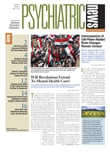When mothers with depression are treated and their depression remits, children also experience an improvement in symptoms and social functioning, even a full year after remission of maternal depression.
That was one of the conclusions from the study "Children of Depressed Mothers 1 Year After Remission of Maternal Depression: Findings From the STAR*D-Child Study," which was published online in AJP in Advance on March 15.
The extent of improvement in children's symptoms and behavior appeared to be related to how quickly maternal remission of symptoms occurs: if mothers had an "early" remission, defined as within the first three months of treatment, children continued to have improvements in symptoms and social functioning more than a year later.
However, if the mother's remission took longer than three months, children a year later showed statistically significant improvements in symptoms but not in social functioning. And children of mothers who did not respond to treatment did not show improvements in either symptoms or social functioning.
The results confirm and extend findings from a previous analysis of maternal depression treatment and childhood psychiatric and behavioral symptoms from the STAR*D (Sequenced Treatment Alternatives to Relieve Depression) child study.
"The message is very clear that if clinicians are treating a mother for depression, they ought to be paying attention to the children, because the children are likely to be having problems," said lead author Myrna Weissman, Ph.D., a professor of epidemiology and psychiatry at Columbia University. "Clinicians should vigorously treat the mother to remission, and if one treatment doesn't work, they should try something else, because the treatment will be having an important effect on the children. Similarly, child psychiatrists treating children should inquire about the mother's psychiatric status and get her into treatment if necessary."
STAR*D (whose Web site is <
www.star-d.org>) was a multisite study designed to determine the comparative effectiveness of different treatment options for outpatients aged 18 to 75 with nonpsychotic major depression. It was conducted from 2000 through 2004 (
Psychiatric News, December 4, 2009).
The STAR*D child study was designed to examine the relationship of maternal remission from depression to children's functioning and psychopathology in mothers who were being treated in STAR*D.
An analysis in the March 22/29, 2006, JAMA titled "Remissions in Maternal Depression and Child Psychopathology: A STAR*D-Child Report" found that there were high rates of psychiatric and behavioral symptoms among children of women being treated for depression in STAR*D, and that children showed improvement in symptoms when their mothers' depression remitted.
"In the current analysis we ask a different question," Weissman explained. "What is the long-term nature of these improvements in children one year after maternal remission? What we found was that if mothers had a remission within the first three months of treatment, the children continued to have improvements in both symptoms and social functioning. If mothers had a remission later than three months, the children showed improvements in symptoms but not social functioning."
The distinction between improvements in symptoms and social functioning is consistent with clinical observations. "Social functioning always takes longer to improve than symptoms," Weissman said.
The STAR*D child study recruited 824 women, aged 25 to 60 participating in STAR*D; of these, 808 women were screened to ascertain whether they had any children aged 7 to 17. A total of 151 mothers who had children in that age range and who met eligibility criteria agreed to enter the study. If a mother had more than one child of eligible age, one was randomly selected to follow.
Children were assessed at baseline and at three-month intervals with the Schedule for Affective Disorders and Schizophrenia for School-Age Children–Present and Lifetime Version, the Child Behavior Checklist, and the Children's Global Assessment Scale for one year after their mothers' remission or for two years if the mothers did not remit. The authors compared children of early remitters (0-3 months; n=36), late remitters (3-12 months; n=28), and nonremitters (n=16).
Weissman told Psychiatric News that rates of treatment among the children were low. But she said that childhood psychiatric treatment did not appear to alter the results.
"If the child had a psychiatric diagnosis and was distressed, we gave feedback to the child and family and encouraged treatment and provided referral," Weissman said. "Overall, less than a third of the children entered treatment. There were no differences in amount or type of treatment received by the children—medication, psychotherapy, or both—by maternal remission status. The crucial factor seemed to be maternal treatment and remission."
